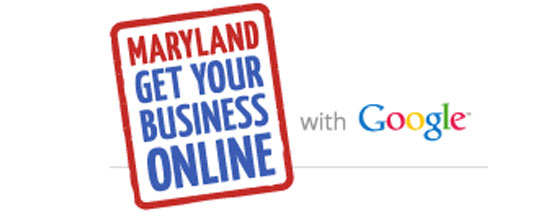Updated 11:32 a.m. 7/12/12: Added new information about creating websites with Intuit
Next Tuesday, Google launches its Get Your Business Online initiative in Maryland with an event at Baltimore’s Legg Mason building downtown. The GYBO initiative, launched almost a year ago, is Google’s campaign to help put online nearly three-fifths of the United States’ 27.5 million small businesses that do not have websites.
“We think it’s imperative for businesses to be online, and in Maryland over half do not have a website,” says Soo Young Kim, head of marketing for GYBO with Google.
The Association of Small Business Development Centers, the business mentorship and counseling nonprofit SCORE, and Intuit have partnered with Google on GYBO. In Maryland, Chris Rieth, the deputy director of public affairs with Governor Martin O’Malley’s office, is spearheading the effort.
“Job creation is the governor’s primary focus, and supporting small businesses, supporting local businesses and helping businesses grow,” says Raquel Guillory, the director of communications with the governor’s office.
Each small business in Maryland that participates receives a free, three-page website through Intuit with free web hosting for one year. Businesses without existing domain names will also receive a free, customized domain name. In addition, all businesses that sign up are given free web tools, like Google Docs, Apps and Spreadsheets, and web training. At the event at Legg Mason on July 17, three different website-building workshops will be held.
After one year, unless a business cancels beforehand, it will be automatically charged $2 per month for a domain name and $4.99 per month for Intuit website hosting. But, according to Intuit’s Terms of Service, if a company chooses to migrate from Intuit after its year of free hosting, the customer stands to lose the content it created during the trial.
Although Kim was unsure as to whether this meant businesses who decide to switch from Intuit lose any website information they’ve uploaded via Intuit’s do-it-yourself SiteBuilder tool, she says the domain names can be transferred to another hosting service “for sure.”
In a follow-up e-mail sent July 12, Jamie Hill, a Google spokesperson, said, “If a customer wanted to copy their website’s files from Intuit’s system before the end of the free year, they can certainly do it. However, it is very unlikely that another provider’s system would be compatible with these files, and they would also no longer have access to SiteBuilder to edit their site. So, Intuit doesn’t ‘block’ them for taking their files with them, but it’s probably not terribly useful that they can.”
“I think it acts as a megaphone for our goals in the governor’s office, as we want to both raise awareness and find ways to empower businesses to grow, expand and prosper,” said Rieth on Facebook. “It’s a positive for small businesses who were already not part of this online market.”
Some local technologists, however, see it differently.
“How could they not realize they are giving Google and Intuit free access to all those small businesses with the state’s blessing and their power of endorsement?” says Ron Schmelzer, co-founder of the Baltimore-based Bizelo, which designs a suite of apps specifically for small business websites. “How could they not realize that there are other Maryland software companies that would want that same opportunity and access?”
Guillory says this is nothing more than “a temporary freebie that [small businesses] didn’t have previously.”
“These are companies who previously hadn’t been reached by available services,” she says. “They had not reached out themselves to create a web presence.”
“We strongly encourage businesses to use all the different online tools and agencies that make sense for them,” says Kim. “This is just one way to get your business online.”
Google brings Get Your Business Online to Maryland among supporters and skeptics







